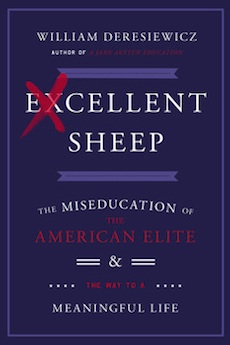By Tara Vasold Fischer
A sense of purpose. A desire to reflect on situations and experiences. A true discovery of self. Are these not all aspirations that we have as individuals? In his groundbreaking manifesto Excellent Sheep, William Deresiewicz causes the reader to examine issues of learning, leadership, and living within the US system of higher education and how we have allowed our values as a society to spiral out of control.
Deresiewicz questions everything and causes his readers to do the same. Why do we as individuals and as a society blur the lines between being valued and valuable? Why do we encourage the development of “perfect people,” focusing on credentialing and living to the test to such a degree that depression and anxiety rates have skyrocketed, especially in affluent American youth? The author argues that the perfectionism that drives many high-achievers is a desperate attempt to avoid criticism and that the educational system created by elite institutions of higher education causes a cynicism that permeates an individual’s ability to share the joy of celebrating the accomplishments of others. If others are doing well, does that mean that I’m not? If I’m not the best, do I matter at all?
As an Ivy League graduate and member of the Yale faculty for over a decade, Deresiewicz calls into question every step of the process—from unpacking issues around family branding and parental over-identification in their children to dissecting the selective admissions process to investigating how students choose a major or career, the author argues that elite institutions are failing. And not only does this failure matter on an individual level, it also matters within our society, as markers of economic inequality and questions over true inclusivity are at the forefront of the national agenda.
A college education should prepare a student for life, not just a job, which means that the return on investment needs to be questioned beyond terms of economic measurement. Deresiewicz asserts that helping individuals develop a sense of what is worth wanting through habitual reflection is how a capacity for change is cultivated. Beyond being excellent sheep who can check off every box, the author points to research that suggests that individuals are happier when connected to others and engaged in meaningful work. According to Deresiewicz, you excel when “doing strenuously what you do well.” When students are encouraged to find purpose, not passion, individuals and the societies they inhabit thrive, since purpose leads people to do something not just be something.
Accepting risk and having the moral courage to reflect on who one is and what one wants to do is key to creating what the author refers to as a “sustainable life.” Embracing situations and experiences with a “willful naïveté” means that an individual is moving past the feeling that what she or he is attempting to do may be impossible.
Deresiewicz asserts that being able to pursue a purpose may be the ultimate form of entitlement and should be treated as such. For many within lower socio-economic classes, the opportunity to pursue a career is only possible because those before them had jobs. The author further questions the common definition and expectation of service and leadership.
A disconnect between what employers say matters to educators in terms of hard and soft skills and what the general public and policy leaders believe matters is emphasized throughout Excellent Sheep. According to Deresiewicz and in support of the true liberal arts model, a proper education prepares an individual for an entire career, not just an initial job. Institutions serve their students best when the most important kind of learning is encouraging how to learn.
Institutions of higher education will aid students and society most if they are able to balance challenge and support. The author suggests that teaching be brought back to the core of the mission at colleges and universities and that rigor be a focus. When faced with the decision about what college to choose, prospective students should look for the place where it’s considered “cool to think.”
Like the form of education the author supports, this book will make you uncomfortable.
Deresiewicz points to issues of privilege and a misuse of prestige throughout Excellent Sheep. He accuses both sides of the political spectrum of sharing equal fault in the establishment of the current system. Despite frustrations with what has been created, Deresiewicz asserts that there is hope for reinventing the system. Excellent Sheep provides a meaningful commentary on the state of higher education in the US and suggests steps that can be taken by engaged and reflective individuals to pursue the world around them with a revitalized sense of purpose in pursuit of societal change.
Tara Vasold Fischer (ΦBK, Dickinson College, 2002) is pursuing a Master’s in Public Policy and Administration at Northwestern University. Northwestern is home to the Alpha of Illinois Chapter of Phi Beta Kappa.




